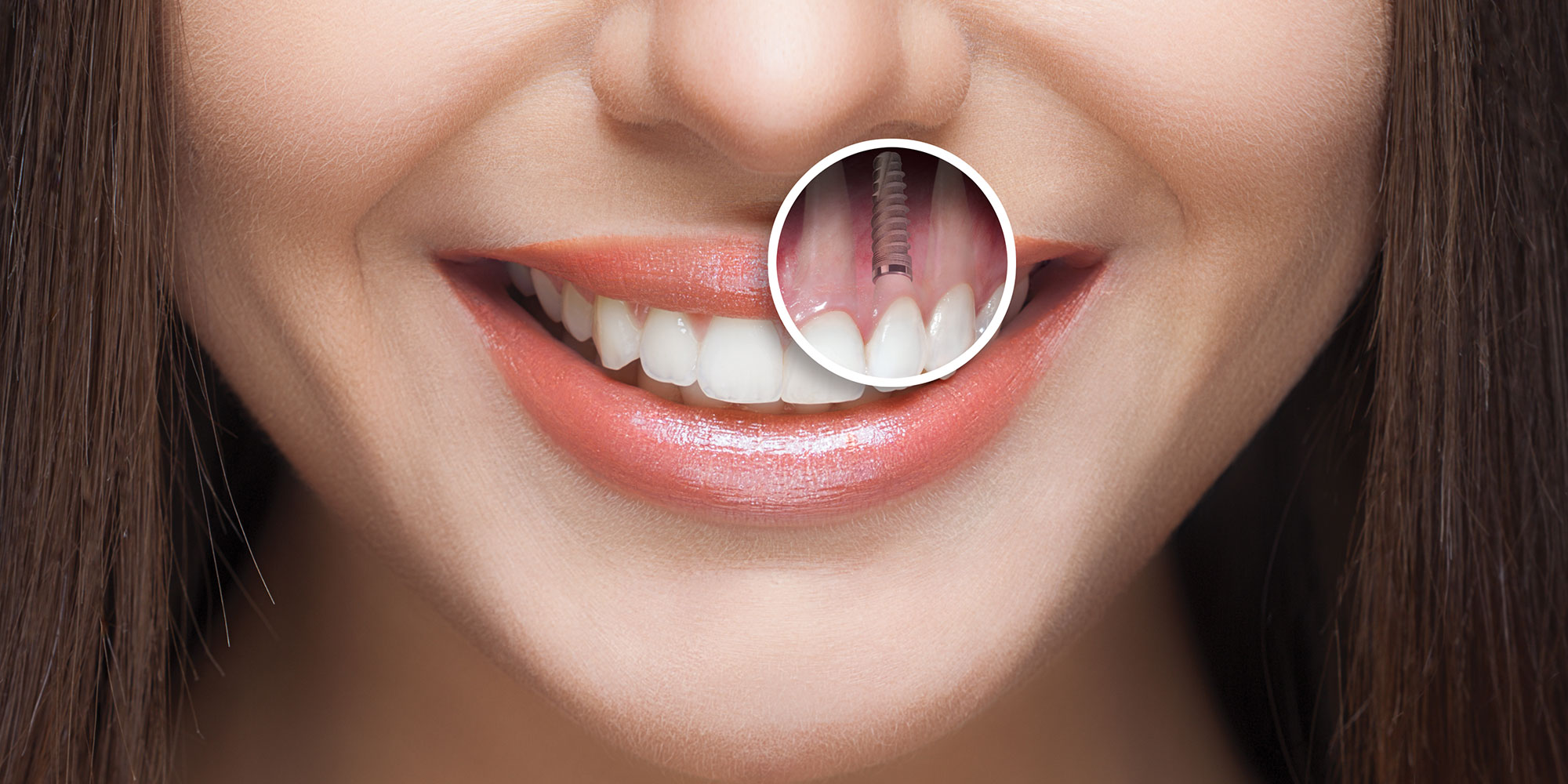WHAT ARE DENTAL IMPLANTS?
A dental implant is basically made of a titanium post and surgically inserted into the jawbone beneath the gum line to function as a tooth root. After the insertion, an implantologist will attach a crown on top of the implant to make it visible as a natural tooth.
WHY DENTAL IMPLANTS?
Missing teeth can turn into below conditions such as:
- Speech problems due to the gap caused by one or more missing teeth
- Chewing difficulties
- Your facial appearance may start to look older than it should be and wrinkle with sunken cheeks as missing teeth can cause sagging of muscles that can’t support lips & cheeks
- Pain in the facial muscles of the jaw resulting in an improper bite induced by the missing teeth
- Decay in teeth and gum disease, over time, due to plaque accumulation & food entrapment in the gap caused by the missing tooth or teeth.
- Improper bite resulting from a tilt of adjacent teeth into the empty spaces caused by a missing tooth
- If missing teeth untreated, it can lead to dent the facial appearance which could cause low set-esteem or lack of confidence.
- To hide the missing tooth or teeth, you will tend to avoid smiling during conversations or at public gatherings
Dental Implants are very helpful when it comes to all the above-mentioned conditions. The success rate of Dental Implant is 98%.
Dental Implants are basically a ‘titanium screw’ which is fused with the Jaw Bone.
Dental Implant
Emergency Care
Teeth cleaning
ADVANTAGES OF DENTAL IMPLANTS
We have a long and proud history givin emphasis to environment social and economic outcomes to deliver places that respond.Lorem ipsum dolor sit amet, consectetur adipisicing elit. sed do eiusmod tempor incididunt ut labore et dolore magna aliqua.
They can restore the lost tooth and become the best solution for your missing tooth.
- They are an everlasting solution with the possibility to even outlive the patient
- Dental Implants are useful when it comes to maintaining the shape and contour of facial appearance & your smile that can go wrong due to missing teeth causing the facial muscles sag
- Dental Implants don’t damage the adjacent tooth structure in any way and protect healthy bone
- They ensure superior appearance and can achieve your comfort with no speech problems to deal
- Dental Implants can enhance your self-esteem as it is a perfect solution to the missing tooth
- Implants set you free to satisfy your food cravings without any worry.
DENTAL IMPLANT PROCEDURE
Placing a dental implant is a multi-step process which is listed as below:
Placing The Implant
Initially, the jawbone should prepare. Then a cut is made to expose the bone for drilling holes which helps for the implant to be placed properly and placed deep into the bone.
The doctor may require bone grafting if the bone is weak or lacks the ability to support implant surgery. Then after the jawbone is healed, the metal post is placed in it.
The procedure takes several months where mostly the time is spent on healing and waiting for the growth of new bone in the jaw.
Then, a temporary crown is given to the patient which is placed to fill the gap, and also for achieving the aesthetic concern. The crown can be taken off for implant procedure, you will have to wait until the bone is healed properly
Healing
Generally, the procedure is 3 to 6 months long depending on the bone health & structure. However, the whole procedure can get completed in one day itself if the patient has good bone structure.
Then, the second surgery can be scheduled but only once the implants are fused with the bone. Your dentists will confirm whether you are ready for the second surgery once taken an x-ray.
The second surgery will be less complicated than the first where a new incision is made to expose the heads of the implants.
Abutment Placement
Sometimes you will need another surgery to place the abutment (the piece where the crown will attach) but only after healing is complete. This procedure is relatively simple usually done with anesthesia in an outpatient setting.
During this surgery, the dentist will re-open the wound to attach the abutment to the dental implant. You will be given a temporary crown for 4 to 6 weeks to let the gums around the abutment heal. This crown is softer which can cushion the implant and may stress the soft tissues that can aid in healing.
You may be required to eat only soft foods after each stage of surgery so to let the surgical site heal properly.
Placement Of Permanent Crown
In the next phase, the dentist will focus on fabricating the permanent crown to look exactly like your natural teeth. All the elements like the surface texture, color, and anatomy will be fabricated to blend with the surrounding dentition.
If you are not happy with the crown for any reason, you may consult your dentist so that it can be sent back to the dental technician for necessary changes.
Impressions of your mouth and remaining teeth are taken to make the crown so that a realistic-looking artificial tooth can be made. The crown won’t be positioned until the jawbone is capable enough to support the new tooth.
It takes a maximum of 2 to 3 weeks to make a permanent crown which will then be cemented or screwed to the Implant.
After this stage, your doctor will explain post-implant care instructions.
POST-OPERATIVE INSTRUCTIONS FOR DENTAL IMPLANTS
Make sure to follow the below post-operative instructions after the implant procedure and consult your doctor for any issue.
- Do not touch, spit or rinse the wound on the day of surgery. Avoid touching the metal healing abutment jutting through the gum tissue.
- After the surgery, some bleeding or redness in the mouth for 24 hours normally can be expected. Biting on a gauze pad (placed on the bleeding wound) for 30 minutes can control the bleeding.
- After the surgery, swelling is normal. To minimize it, apply an ice pack on the cheek in the surgical area (a plastic bag or an ice-filled towel can also be used). Apply the ice as much as you could for the first 36 hours.
- Follow a liquid meal but do not drink hot beverages. Go for a soft diet on the day of surgery. You can get back to the normal diet right after the surgical area is healed. Don’t use straws.
- Take pain medications as soon as you feel the effects of the local anesthetic are reducing. However, take only the medicines prescribed by your dentist.
- Use the prescribed oral rinse while the day after surgery, use the prescribed oral rinse twice – after breakfast and before bed. Rinse for at least 30 seconds and then spit it out. Use warm salt rinses at least 4-5 times a day as well.
- Avoid using tobacco products in any form or any type after implants. It not only makes healing difficult but may also increase the chances of implant failure.
- Don’t do exercise immediately after the surgery or keep it minimal at best. You should be aware that what exercise may cause bleeding or throbbing, and it really happens, stop the activity immediately. This may weaken you since you’re not taking normal nourishment.
- Rinse them frequently and keep them clean as much as possible. Wait for the stitches to dissolve and then purify the abutments by giving a gentle massage.
- Don’t use partial or full dentures or flippers immediately after surgery or for 10 days afterward at least.
POST IMPLANTS CARE
Good oral hygiene is vital to improve your oral health:
- Brush twice a day to maintain good oral hygiene
- Choose a toothbrush with a small head and soft bristles
- Replace your toothbrush after every two to three months
- Go softly & and don’t use too much force while brushing as it might cause abrasion
- Floss at least once a day
- Always take good oral care at home
- Use mouth rinses once a day after every meal to stay on the pinnacle of your oral health
- Avoid sticky foods
- Maintain a proper diet.
Visit the dental clinic regularly and achieve good oral hygiene to make your implants last for life.

